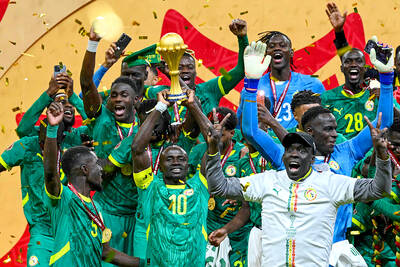After midnight during Ramadan, makeshift floodlights transform a central Karachi basketball court into an urban cricket arena, where dozens of young Pakistani men chase taped-up tennis balls zipping through the night air.
Donkeys watch on from the outfield and goats rummage through nearby piles of rubbish, breaking occasionally for a pitch invasion.
“After the Taraweeh [special Ramadan prayers], people crave entertainment, so that is why many play cricket,” batsman Waqas Danish said. “They play all night, because some people can’t wake up for breakfast if they sleep.”

Photo: AFP
Tape-ball games are ubiquitous across Karachi’s streets throughout the year, but Ramadan sees night tournaments pop up in most neighborhoods. The uninitiated might struggle to unravel the mayhem of multiple overlapping matches in a cramped space, but for Karachi’s street cricketers, there is method in the madness.
The frenetic matches of between four and six overs per innings are concluded before the meal consumed ahead of daytime fasting. They range from pick-up games on improvised concrete pitches to professional competitions on dusty ovals.
“The kids and youths can’t afford kits and all the accessories for playing hard-ball cricket, but they can easily afford the tape ball,” competition organizer Taqdeer Afridi said.
Money is often involved — even though gambling is illegal in Pakistan — and big-hitting mercenaries are occasionally lured from surrounding neighborhoods to play under lights that craftily tap into overhead power lines.
A tennis ball is tightly bound with electrical tape, giving it extra weight so that it swings much like a cricket ball, yet is less damaging if it hits a spectator, window or even a passing rickshaw.
Matches played in the poorest neighborhoods can draw hundreds of spectators, with many onlookers saying that watching cricket all night helps with the day’s fast.
“All day they are sleeping. Maybe they go to their jobs for four or five hours,” 19-year-old spectator Rahman Khan said.
After Partition in 1947, cricket was considered the domain of the upper class, played at Karachi’s posh clubs and elite schools, but as the population boomed through the 1960s, the sport adapted to the sprawling metropolis and tennis balls emerged as a substitute to the hard ball.
The cheaper alternative — which also removes the need for costly equipment such as batting pads — took on several experimental forms in the following decades, and is credited with bringing the sport to the everyday Pakistani.
There is no consensus on when the first tape ball delivery was bowled or by who, but legends abound — and the one thing historians and fans agree on is that it originated in Karachi.
“The tennis ball without tape lacked speed,” said Nasir Ali, who recalls the 1980s as the formative years for the tape-ball game.
“On an experimental basis we wrapped the ball with red tape, and when it was bowled the speed was amazing,” said the 64-year-old, who hosts an annual competition in his apartment block’s courtyard.
From legendary all-rounder Wasim Akram to modern-day pace star Shaheen Shah Afridi, many of Pakistan’s top players credit street cricket as a positive influence on their techniques.
“In cricket there is a saying: ‘Watch the ball’ — it doesn’t matter if it is a tennis ball or a taped ball or a hard ball,” Pakistan national youth coach Mohammad Masroor said. “If a batsman can hit any ball, he can play cricket.”
Watching young cricketers at a street pitch wedged between an elevated expressway and an apartment block in central Karachi, Masroor said rules adapted to the urban landscape hone a batsman’s skills.
Players must also beware of the “grumpy uncle or aunty” who is unwilling to return a ball hit into their home. A shot like that can cost a batsman more than just his wicket: They need to go buy a new ball, too.
“Nothing stops them,” Masroor said, grinning.

Manchester United on Tuesday confirmed Michael Carrick as interim manager until the end of the season, tasking him with leading the Red Devils back into the UEFA Champions League. “Having the responsibility to lead Manchester United is an honor,” said Carrick, 44, who won 12 major trophies in his 12-year playing career at United. The former midfielder previously had an unbeaten three-game stint as caretaker boss at Old Trafford in 2021. Carrick then took on his first permanent managerial role at second-tier Middlesbrough in October 2022 and was sacked in June last year after the club finished 10th in the

MARRED FINAL: As most of Senegalese players walked off the pitch after a controversial decision, some supporters threw objects and attempted to get onto the pitch Senegal on Sunday won the Africa Cup of Nations (AFCON) as Pape Gueye’s extra-time winner sunk hosts Morocco 1-0 after a chaotic final that saw the eventual champions storm off the pitch late in the game. Brahim Diaz could have won the trophy for Morocco with a controversial spot-kick in the 24th minute of added time at the end of normal time as ugly scenes broke out in the stands. However, Senegal goalkeeper Edouard Mendy easily saved the weak attempted “Panenka” chip by the Real Madrid winger, who was clearly distracted by the long delay that followed the penalty award.

James Harden on Friday scored 31 points and came up big in overtime to help the Los Angeles Clippers erase a double-digit deficit on the way to a 121-117 NBA victory over the Toronto Raptors. Harden scored 16 points in the fourth quarter and overtime as the Clippers pushed their wining steak to five games despite the absence of star Kawhi Leonard with a sprained right ankle. The Clippers trailed by 11 entering the fourth quarter, but Harden drilled a pair of free-throws with 1:24 left in regulation to tie it and after misses from both teams, they went to

Dallas Mavericks rookie Cooper Flagg on Wednesday was ruled out for the second half of their 118-109 loss to the Denver Nuggets after the No. 1 pick sprained his left ankle in the first half. Flagg was called for a foul while defending against Peyton Watson and turned the ankle as he fell to the floor with 6 minutes, 1 second left in the second quarter. Flagg limped to the bench and continued to the locker room, but returned for the final 2 minutes, 35 seconds before the break. The 19-year-old did not come out for the second half before the announcement that